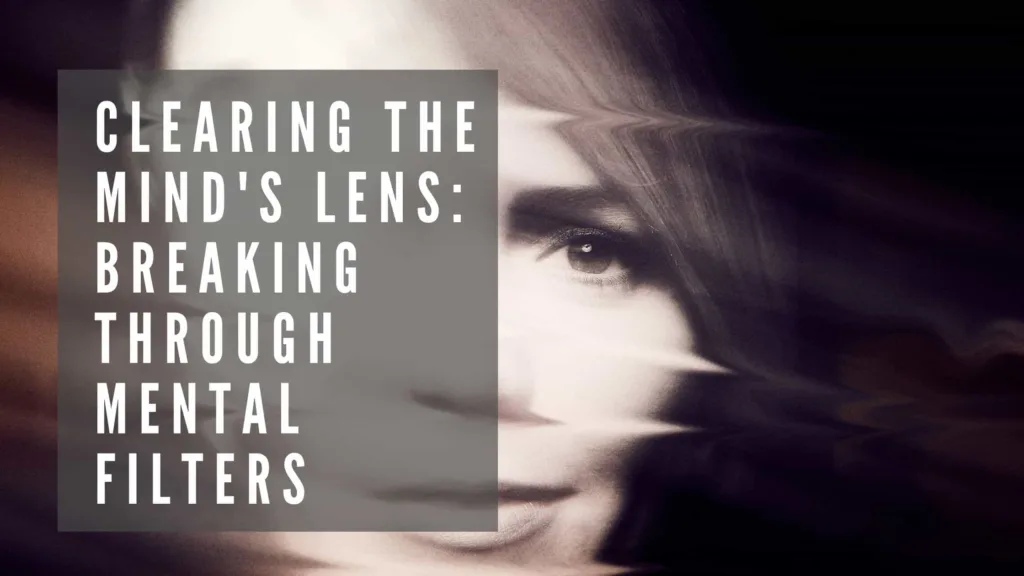Our brains are like filters, sorting through loads of information every day. But sometimes, this sorting gets mixed up, making us see things in a funny way and feel not so good. This is called the “mental filter,” a fancy term in psychology that helps explain why we might have trouble feeling okay.
What is a Mental Filter?
A mental filter is like wearing glasses that only let you see some things clearly while making other stuff blurry. Imagine these glasses tinting everything you see with a certain color, changing how you feel about what’s happening around you. This happens without you even realizing it. So, you end up paying attention to some things more than others, and it affects how you understand and think about stuff without you even knowing it.
Think of someone who always sees the bad stuff, like when they get a good grade, they think, “It’s not good enough,” or when someone says something nice to them, they don’t believe it. They only see the negative things and ignore anything good. It’s like wearing glasses that make everything seem sad, even on a sunny day.
Types of Mental Filters
- Seeing the Bad: This filter makes you notice the bad things more than the good. It’s like focusing on the one red mark on your paper instead of all the correct answers.
- Ignoring the Bad: This one makes you see only the good stuff and ignore anything bad. It’s like pretending that you never got a low grade because you only want to think about the times you did well.
- Sticking to Your Beliefs: This filter makes you only pay attention to things that agree with what you already think. It’s like only listening to people who say you’re good at something, even if others give you helpful advice.
- Blowing Things Up: This filter makes small problems seem like big disasters. It’s like thinking that dropping your phone means it’s ruined forever, even though it’s just a little scratch.
- Making Big Assumptions: With this filter, you think one bad thing means everything is bad. It’s like thinking one bad day at school means you’ll always have a bad time there, even if most days are good.
These mental filters can affect how you see the world, but knowing about them can help you understand and change your thoughts.

Effects on Mental Well-being
- Feeling Down and Anxious: When you keep thinking about bad things, it can bring you down and make you worry a lot.
- Missing the Good Stuff: If you only focus on the bad and ignore the good, it feels like nothing ever goes right.
- Stress and Nerves: Always expecting bad things can make you super stressed and tense all the time.
- Not Having Fun: When you’re stuck on the negatives, it’s hard to enjoy the good stuff like you used to.
- Feeling Alone: It’s like you’re wearing glasses that only see the bad stuff, so even when people are nice, it’s hard to feel like you’re not alone.
Related Info: Selective Attention: Filtering the Noise
How to Overcome Mental Filter?
- Pay Attention to Your Thoughts: Start noticing when you’re thinking sad or worried things. Catching those thoughts is the first step to changing them.
- Look for the Good Stuff: Try to find the good things happening around you, even small ones. It can help balance out the bad stuff.
- Ask Yourself Questions: When you have bad thoughts, ask yourself if they’re really true. Sometimes, they’re not as bad as they seem.
- Keep it Real: Try to see things as they truly are, without making them seem worse than they are.
- Talk to Someone: Share your thoughts with someone you trust. They might change how you view things.
- Be Thankful: Take time to think about the good things in your life. It can help you focus on the positive.
- Be Kind to Yourself: Don’t be too hard on yourself for having bad thoughts. It’s okay to feel down sometimes.
Mental filters are like special glasses that change how you see things. They have a big impact on how you feel and what you think about life. But if you learn to notice when they’re making things look weird and use some tricks to see things more clearly, you can feel better and grow stronger emotionally.

Pingback: Flashbulb Memory: Photographs of the Mind
Pingback: Serial Position Effect: Remembering the Sequence